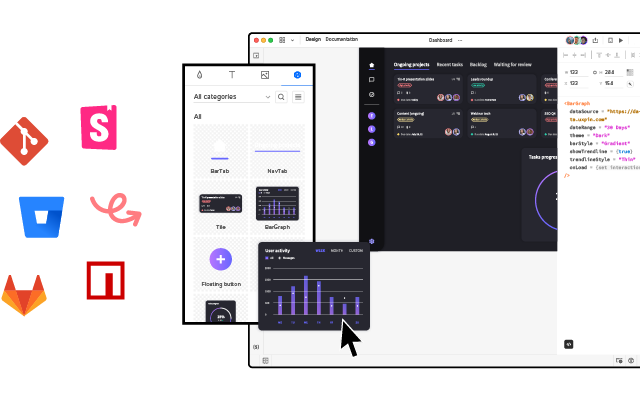Software Engineer vs Web Developer – What is the Difference?

Comparing software engineers and web developers can provide valuable insights into the nuances of each role, helping you make informed decisions about your career path, skill development, and professional growth.
Build user interfaces with the best user experience with UXPin Merge, a code-first UI builder. Drag and drop UI components from top open-source libraries and create layouts without designer’s help. Design websites, web apps and copy HTML, CSS or React code off your design. Try it for free.
Who is a software engineer?
A software engineer is a professional who applies engineering principles to the design, development, testing, and maintenance of software systems. They are responsible for creating software solutions that meet specific requirements, solve problems, and deliver value to users or organizations.
What do software engineers do?

Software engineers are involved in the following areas of app design and development.
- Design: Software engineers are involved in designing software systems, including determining system architecture, data structures, algorithms, and user interfaces. They work closely with stakeholders to understand requirements and translate them into technical specifications.
- Development: Software engineers write code to implement the design of software systems. They use programming languages, frameworks, and tools to develop applications, modules, or components that perform various functions and tasks.
- Testing: Software engineers are responsible for testing software to ensure its quality, reliability, and performance. This includes writing and executing test cases, debugging and fixing defects, and conducting performance optimization of software products.
- Maintenance: After deploying software, engineers are involved in its ongoing maintenance and support. This may include troubleshooting issues, applying updates or patches, and making enhancements or improvements based on user feedback or changing requirements.
- Collaboration: Software engineers often work as part of a multidisciplinary team, collaborating with other engineers, designers, product managers, and stakeholders. Effective communication and teamwork are essential for delivering successful software projects.
- Continuous Learning: The field of software engineering is constantly evolving with new technologies, tools, and methodologies. Software engineers engage in continuous learning to stay updated with the latest trends and best practices in the industry.
They can specialize in various domains such as web development, mobile app development, embedded systems, data science, artificial intelligence, and more. They may work in diverse industries including technology, finance, healthcare, e-commerce, entertainment, and government.
Who is a web developer?
A web developer is a specialized type of software developer who focuses specifically on building websites and web applications that run on the internet. Web developers use technologies such as HTML, CSS, and JavaScript to create the visual and interactive components of websites.
They also work with backend technologies like server-side scripting coding languages (e.g., PHP, Python, Ruby) and databases to manage data and server-side logic.
Web developers may specialize in frontend development, focusing on the user interface and client-side scripting, or backend development, focusing on server-side logic and database management. They can also become full-stack web developers who create both, frontend and backend of application development.
They collaborate with designers, content designers, and other developers to create websites that meet client requirements and user needs.
What is a web developer job?

The job of a web developer primarily involves designing, building, and maintaining websites and web applications. Here’s a breakdown of the key aspects of a web developer’s job:
- Web Design: Web developers collaborate with designers or utilize their design skills to create the visual layout and user interface of websites. This involves using technologies like HTML (Hypertext Markup Language) for structuring content, CSS (Cascading Style Sheets) for styling elements, and possibly JavaScript for interactive features.
- Frontend Development: Frontend development refers to implementing the visual and interactive elements of a website that users see and interact with directly in their web browsers. Web developers use frontend technologies such as HTML, CSS, and JavaScript frameworks like React.js, Angular, or Vue.js to create responsive, user-friendly interfaces.
- Backend Development: Backend development involves building the server-side logic and database management functionalities that power websites and web applications. Web developers use server-side programming languages such as Python, PHP, Ruby, or Node.js to handle requests from the frontend, interact with databases (e.g., MySQL, MongoDB), and perform various computations or data manipulations.
- Web Application Development: In addition to static websites, web developers often work on dynamic web applications that require more complex functionality, such as user authentication, data processing, and real-time updates. This may involve implementing RESTful APIs (Application Programming Interfaces) to enable communication between the frontend and backend components of the application.
- Testing and Debugging: Web developers are responsible for testing their code to ensure it functions as intended and is free of errors or bugs. This may involve manual testing, automated testing, or using debugging tools to identify and resolve issues.
- Optimization and Performance Tuning: Web developers optimize websites and web applications to improve performance, loading times, and user experience. This may include optimizing code, images, and other resources, implementing caching mechanisms, and following best practices for web development.
- Maintenance and Updates: After launching a website or web application, web developers are responsible for ongoing maintenance, updates, and troubleshooting. This includes fixing bugs, applying security patches, adding new features, and ensuring compatibility with different web browsers and devices.
Overall, the job of a web developer encompasses a wide range of tasks related to designing, building, and maintaining websites and web applications to meet client requirements and user needs.
What software engineer and web developer have in common?
Both software engineers and web developers share several commonalities despite their distinct roles and focuses within the field of software development. Here are some key similarities.
Technical Skills
Both roles require proficiency in programming languages and technologies. While the specific languages and frameworks may vary, both software engineers and web developers need to write code to create functional and efficient software solutions.
Problem-Solving Abilities
Both roles involve solving complex problems and implementing solutions that meet user needs and project requirements. Whether it’s designing a software architecture or troubleshooting a bug in a web application, problem-solving skills are essential for success in both roles.
Understanding of Software Development Lifecycle
Both software engineers and web developers typically follow similar processes and methodologies for software development, such as Agile or Waterfall. They understand concepts like requirements gathering, design, development, testing, deployment, and maintenance.
Focus on User Experience
Both roles emphasize the importance of creating user-friendly and intuitive software products. Whether developing a desktop application or a web interface, software engineers and web developers prioritize usability and strive to deliver a positive user experience.
Quality Assurance and Testing
Both software engineers and web developers are responsible for ensuring the quality and reliability of their software products. They perform various testing activities, such as unit testing, integration testing, and user acceptance testing, to identify and address issues before deployment.
While software engineers and web developers may specialize in different areas and technologies, they share a common foundation of skills, methodologies, and principles essential for developing high-quality software solutions.
Project management
Project management is a valuable skill for both job titles. While their primary focus is on technical aspects of development, both roles often require collaboration with other team members, adherence to project timelines, and effective communication with stakeholders.
Collaboration and Communication
Both roles involve collaborating with cross-functional teams, including designers, product managers, quality assurance engineers, and stakeholders. Effective communication skills are essential for conveying ideas, discussing requirements, and coordinating efforts to deliver successful projects.
Evolving skill sets
Technology in both software engineering and web development is constantly evolving, so professionals in both fields must stay updated with the latest trends, tools, and best practices. Continuous learning and skill development are crucial for staying competitive and advancing in both careers.
Key differences between software engineer and web developer

While there are overlaps in skills and responsibilities, these differences highlight the distinct roles and focuses of software engineers and web developers within the broader field of software development.
Scope of Work
Software engineers work on a wide range of software applications, systems, and platforms, which can include desktop software, mobile apps, embedded systems, and more. They may be involved in developing complex software solutions that are not necessarily web-based.
Web developers specialize in building websites and web applications that run on the internet. Their focus is primarily on the development of web-based interfaces, functionalities, and interactions.
Technologies and Tools
Software engineers may work with a diverse set of programming languages, frameworks, and tools, depending on the specific requirements of the project. They might use languages like Java, C++, Python, or Swift and frameworks like .NET, Spring, or Django.
Web developers primarily work with web technologies such as HTML, CSS, and JavaScript for frontend development. They may also use frontend frameworks/libraries like React.js, Angular, or Vue.js, as well as backend technologies like Node.js, PHP, Ruby on Rails, or Django.
Development Environment
Software engineers often work in various development environments, including IDEs (Integrated Development Environments) and text editors, depending on their language and platform preferences. They may also need to set up development environments for different operating systems and environments.
Web developers typically work with web development tools and environments tailored for frontend and backend development. These may include code editors like Visual Studio Code, Atom, or Sublime Text, as well as web development frameworks and libraries specific to web development.
Types of Projects
Software engineers can work on diverse projects, including standalone applications, enterprise systems, embedded software for devices, operating systems, and more. Their projects may involve a wide range of complexities and functionalities.
Web developers primarily work on projects related to websites and web applications. This can include e-commerce sites, content management systems, web portals, social media platforms, and various web-based tools and services.
Career Paths and Specializations
Software engineers have diverse career paths and can specialize in areas such as software architecture, systems development, machine learning, cybersecurity, and more. They may also advance into roles like technical leads, engineering managers, or software architects.
While web developers can also specialize in frontend or backend development, their career paths may be more focused within the realm of web development agencies, e-commerce companies, digital marketing firms, or as freelance developers specializing in web projects.
Which tech career is better?

Both software engineering and web development offer rewarding career opportunities with their own unique challenges and advantages.
The tech industry and job market demand for both web developers and software engineers fluctuates over time and can vary depending on industry trends and technological advancements. Web developers may be in high demand in industries such as e-commerce, digital marketing, and online services.
Software programmers may be highly sought after in industries that require complex software systems, such as finance, healthcare, and technology.
As a beginner, consider which field aligns more with your interests, aptitude, and long-term career goals. If you’re passionate about building complex software systems, working with different programming languages, and solving challenging problems, software engineering might be a better fit. Then, find engineering bootcamps or get a computer science bachelor’s degree to learn fundamentals of computer programming.
On the other hand, if you’re drawn to creating visually appealing websites, working with web technologies, and seeing immediate results, web development could be more suitable. An average salary for web developer is lower than for software engineer but this career may be much more rewarding for those of you who appreciate working on visually appealing and interactive projects.
What is frontend engineer?
A frontend engineer is a subset of web developers who focus specifically on building the client-side of web applications. They are responsible for creating the user-facing portion of websites or web applications, including layout, design, and interactivity.
Frontend engineers work closely with designers to implement visual elements and user experience (UX) designers to ensure a smooth and intuitive user interface. They primarily work with HTML, CSS, and JavaScript frameworks like React, Angular, or Vue.js to build responsive and interactive web interfaces.
While software engineers have a broader scope and can work on various types of software projects, web developers and frontend engineers specialize in building web applications and focus on different aspects of the development process. Web developers may work on both frontend and backend components, while frontend engineers specifically focus on the client-side of web development.
Build UI with UXPin Merge
Create top-notch user interfaces effortlessly with UXPin Merge, the ultimate code-first UI builder. Simply drag and drop UI components from leading open-source libraries, crafting layouts without needing a designer’s assistance. Whether it’s websites or web apps, UXPin Merge lets you design with ease, allowing you to copy HTML, CSS, or React code directly from your designs. Try it for free.




